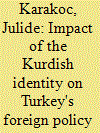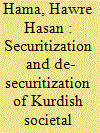| Srl | Item |
| 1 |
ID:
099828


|
|
|
| 2 |
ID:
005081


|
|
|
|
|
| Publication |
London, Zed Books, 1994.
|
| Description |
viii, 120p.pbk
|
| Standard Number |
1856491005
|
|
|
|
|
|
|
|
|
|
|
|
Copies: C:1/I:0,R:0,Q:0
Circulation
| Accession# | Call# | Current Location | Status | Policy | Location |
| 036165 | 956.67/CHA 036165 | Main | On Shelf | General | |
|
|
|
|
| 3 |
ID:
099805


|
|
|
|
|
| Publication |
2010.
|
| Summary/Abstract |
In the 1930s, certain Kurds in Damascus mobilized in support of Kurds from the Jazira, the remote north-east of Syria (then under French mandate), who were demanding the establishment there of a Kurdish autonomous zone. Why did they do this? Rather than assuming that it was a political action flowing from a self-evident sense of Kurdish identity, this article explores the micropolitics of Damascus under French rule, and the effect of the development of the nation-state form in Syria, to account for the origins of a new politics of ethnicity.
|
|
|
|
|
|
|
|
|
|
|
|
|
|
|
|
| 4 |
ID:
184232


|
|
|
|
|
| Summary/Abstract |
The four countries hosting Kurdish populations in the Middle East have mainly been politically centralized in character and sought to follow a homogeneous nation-state model through the assimilation of their Kurdish communities. Drawing on the concepts of societal security, securitization, and de-securitization derived from the theories of the Copenhagen School, this article examines Kurdish (in)security in the Middle East and argues that the Kurds have experienced significant societal insecurity due to the adoption of assimilation strategies by their host states. I posit that federalism and power sharing are the two obvious de-securitization strategies that may address the securitization of Kurdish identity in the states with significant Kurdish populations. I further argue that, while the federal model has appeared to manage securitized Kurdish identity in Iraq since 2003, this solution may not be applicable to Turkey, Iran, and Syria. Alternatively, consociational power sharing as a form of institutional de-securitization carries the potential to address Kurdish identity in these countries.
|
|
|
|
|
|
|
|
|
|
|
|
|
|
|
|